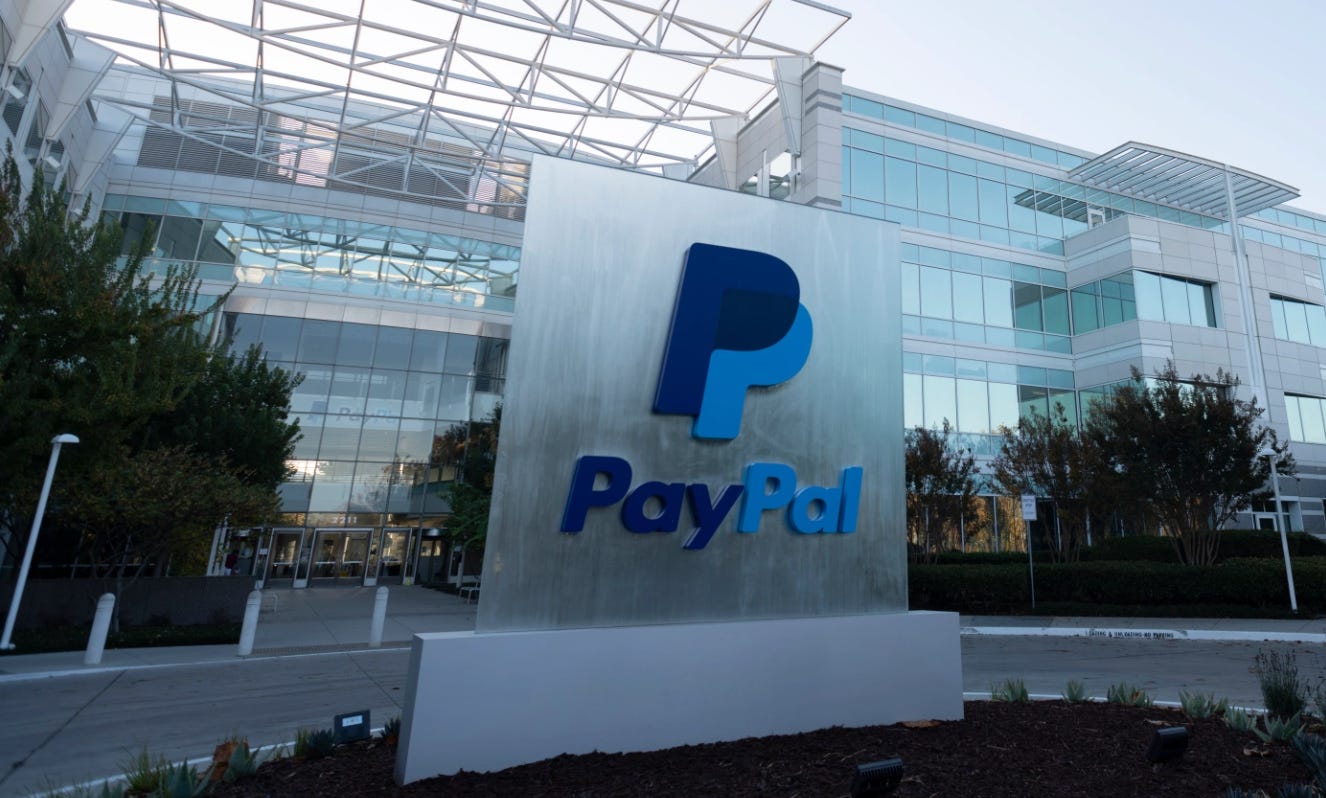Issue № 73 | London, Sunday 26 February 2023
📸 First, flashback to November when we considered Brew Dog’s World Cup marketing campaign. This week, the brewer revealed the true extent of its hypocrisy. Flashback further to October when we talked about the need for an impartial way to assess green credentials. This week, BNP Paribas was hit with ‘world’s first climate lawsuit’.
👉🏻 Now, read on to learn why:
① BNPL is attracting the attention of payment giants.
② Staying competitive demands investing in new technologies or partnerships.
③ The so-called benefits of Brexit continue to underwhelm.
④ The promise of the Kalifa Review remains unfulfilled.
⑤ Social media companies are embracing a new business model.
⑥ Poor management and nonsensical metrics are the real productivity problem.
⑦ It’s time to take artificial intelligence seriously.
What's new

PayPal, the American online payments firm, has recently announced its acquisition of Paidy, a Japanese buy now, pay later (BNPL) provider, for $2.7bn. The acquisition is set to be completed in the fourth quarter of 2021.
Why it matters
The BNPL market has seen significant growth in recent years, particularly in the wake of the COVID-19 pandemic, as consumers look to spread the cost of purchases. According to a report by eMarketer, the global BNPL market is expected to grow by almost 20% this year, reaching a total value of $1.2tn. This trend is particularly evident in Asia, where BNPL is becoming increasingly popular.
Paidy is a leading BNPL provider in Japan, with over 6 million registered users. Its platform allows customers to make purchases online and then pay for them later in instalments. By acquiring Paidy, PayPal will be able to expand its presence in the Japanese market and capitalise on the growing demand for BNPL services in the region.
① This move will help PayPal compete with other BNPL providers, such as Klarna and Affirm, who have already established themselves as major players in the sector. It also positions PayPal as a key player in the growing BNPL market in Asia, which is expected to be worth $166bn by 2025.
What marketing leaders should do
Marketing leaders in B2B financial, fintech or technology sectors should take note of this acquisition and consider how it may impact their own businesses. The acquisition of Paidy by PayPal highlights the growing importance of the BNPL market, particularly in Asia.
Marketing leaders should assess whether they are currently offering BNPL services to customers and whether there is potential to expand into new markets. They should also monitor the BNPL market closely, particularly in Asia, and keep an eye on any new developments or acquisitions that may impact the sector.
② By staying up-to-date with the latest trends and developments, marketing leaders can ensure that their businesses remain competitive and continue to meet the needs of their customers. This may involve investing in new technologies or partnerships to improve the customer experience and stay ahead of the competition.
Overall, the acquisition of Paidy by PayPal is a significant development in the BNPL market, and marketing leaders should pay close attention to how this will impact the sector in the coming months and years.
Take action
Everything you’ve just read - every word from What’s new onwards - was written not by a marketer with more than 20 years experience but by a robot. I haven’t edited so much as a single letter or punctuation mark (although I did help by sourcing the image.)
In a week that saw my favourite productivity app, Notion, integrate an AI assistant, and J.P. Morgan ban ChatGPT, I thought it was time to put the tech to the test.
Here’s the prompt I used to generate this week’s briefing:
Select one news story, published in the last seven days, that will be interesting to marketing leaders in the B2B financial, fintech or technology sectors. Summarise it, then explain why it matters to them and what they should do about it this week.
The results are not perfect - the glaring mistake our robot overlord made was selecting a ‘news’ story from September 2021 - but I think you’ll agree they’re impressive. Indeed, this week no less than Henry Kissinger, Eric Schmidt, and Daniel Huttenlocher joined forces to co-write a WSJ op-ed on why generative artificial intelligence represents an intellectual revolution.
As ever, the ‘garbage in, garbage out’ rule applies - you have to be very precise with your requests and sceptical about the answers - but I think the one action you really should take this week is it look into artificial intelligence (I beg you though, don’t get ‘too close’.)
Get help
Visit InMarketing, my resource library for leaders in finance or technology who want to innovate, interact and influence.
Join the InMarketing community, either on Twitter or on Substack (you’ll need to download the Substack app and head to the chat tab). Either way, you can ask questions of me and fellow senior marketing practitioners.
Help me
If you found this useful or know someone who would, please share it. It would really help me to grow the community of regular IMTW readers.
Top stories
The other articles that are worthy of your time.
FINANCE
FCA to secure the UK’s status as an international hub for asset management
③ The so-called benefits of Brexit continue to underwhelm.

“The Financial Conduct Authority is looking to overhaul rules governing the asset management industry in a bid to keep the UK attractive to international money managers following Brexit.”
“In a discussion paper published this week, the FCA said it was looking to ‘improve asset management regulation with a more modern and tailored regime’ as part of its overhaul of financial rules post-Brexit.”
The UK asset management industry – which collectively handles around £11 trillion in assets – is still governed by retained EU laws which the FCA will now have powers to reform under the Future Regulatory Framework, tabled by ministers to boost powers of UK financial regulators.”
TECHNOLOGY
Kalifa Review, two years on: What progress has been made?
④ The promise of the Kalifa Review remains unfulfilled, most notably the London Stock Exchange is not yet seen as a top-tier destination for tech listings, and the UK is still missing a fully operational crypto regulatory regime.

Policy and regulation: “The Scalebox and the DET was last heard of in April 2021 at the time of the launch of the Review, but Rishi Sunak has announced a newly formed Department for Science, Innovation and Technology, bringing together research and funding from BEIS with the digital policymaking from DCMS.”
Skills: “In August 2022, it was announced that high growth companies would be able to attract exceptional talent to the UK with new Scale-up visa which allows businesses to employ high-skilled individuals who will receive two years’ leave to remain in the UK without requiring further sponsorship or permission beyond the first six months.”
Investment: “In August 2022, it was revealed that Lord Hammond is among a host of heavyweight figures being enlisted to back the new venture, which has been provisionally named the Fintech Growth Fund. Other names cited include fintech veteran Al Lukies and the Fintech Alliance's Phil Vidler.”
International: “This month, CFIT named Ezechi Britton as its first CEO. CFIT’s core objectives are to bring together time-limited ‘coalitions’ of experts to address barriers to fintech sector growth; and to support the creation of high-income, tech-based employment nationwide; firms achieving global scale; and improving access by citizens and small businesses to financial services.”
National connectivity: “Innovate Finance, FinTech Scotland and FinTech North have created a national network that will encourage innovators up and down the country to connect and form multiple fintech hubs and centres of excellence.”
MEDIA & MARKETING
Facebook sells subscriptions as the ad business stumbles
⑤ Social media companies are embracing a new business model.

“From this week Facebook users and those of its sister app, Instagram, will have the option of paying $11.99 a month for a ‘verified’ account, buying them better customer service, more widely distributed posts and a blue badge next to their name. The subscription is the latest example of a growing trend.”
“After years of non-stop growth the online-advertising business has hit a speed bump. The great one-off shift of ad budgets from offline locations, like newspapers, to the web is mostly complete. And since 2021 mobile advertising has been hampered by anti-tracking rules pioneered by Apple, which make it harder for apps like Facebook to target ads and measure their effectiveness.”
“To the extent that social networks embrace subscription it will mean a windfall for the mobile platforms that host their apps. Google and Apple make no money from apps’ advertising revenue, but take a cut of consumers’ in-app purchases, including recurring subscriptions. Having whacked the mobile ad business with new privacy rules, Apple and Google stand to profit from the resulting move to subscriptions. But consumers may learn that they can get a big discount by signing up outside Apple and Google’s ecosystems.”
WILDCARD
Tech’s productivity obsession is toxic
⑥ Poor management and nonsensical metrics are the real productivity problem.

“Some 65 percent of Britons, 63 percent of Americans, and 58 percent of Australians rank productivity above having a healthy body, more money, or being happy.”
“The idea that workers have become unproductive in the remote work era seems one that comes mainly from managers. Microsoft’s September 2022 Work Trend Index, a survey of 20,000 employees across 11 countries, found that 87 percent of employees say they are productive at work, but 85 percent of managers say they’re not confident that’s true. Nuanced assessments of success are being replaced by mechanistic approaches and an overload of data (the assessment of which is a time suck for employees too).”
“Intensifying the focus on productivity for the sake of productivity—including calling employees back to the office five days a week—could be short-sighted. With work happening in more digital and physical places than ever before, and through countless workflows and technologies, the parameters that were previously used to measure what a worker is doing are simply unfit for purpose. Instead of often arbitrary and opaque measures, companies need to develop more thoughtful, tailored approaches.”
Off cuts
The stories that almost made this week’s newsletter.
FINANCE
🌎 Biden nominates ex-Mastercard CEO Banga for World Bank president
🥳 HSBC: Ups tech spend 19% since 2019 and more than doubles profits
🍾 Citigroup bucks Wall Street trend to give CEO Jane Fraser a pay rise
🧀 Communication lapse causes Credit Suisse share drop
TECHNOLOGY
🙅🏻 E-money groups need ‘significant shift in culture’, UK regulator says
🥇 Which European banking app is winning the race for customers?
🕵🏻 ECB to monitor digital transformation efforts at banks
⛓️ BIS floats unified programmable ledger to turbocharge payments innovation
👮🏻♂️ Regulation stole the show at Barcelona’s European Blockchain Convention
MEDIA & MARKETING
🫡 Sir Bernard Ingham press secretary to Margaret Thatcher dies age 90
🗞️ Instagram’s co-founders’ personalized news app Artifact launches
🧑🏻💻 HANetf hires head of business development
🚫 European Commission staff are banned from using TikTok
🎧 YouTube Music is adding podcasts
The last word
⑦ Mark Read, CEO of WPP, on ChatGPT:

“The best technology is like magic. Is it perfect? No, but it’s brought to life the potential of generative AI in a way that’s really captured people’s imagination.”
Don’t settle for marketing.
Strive for InMarketing: innovate, interact, influence.
Wishing you a productive week,
P.S. I introduced my youngest son to The Paper for movie night on Friday. It’s nearly 30 years old now but still one of the best films about journalism ever made.




